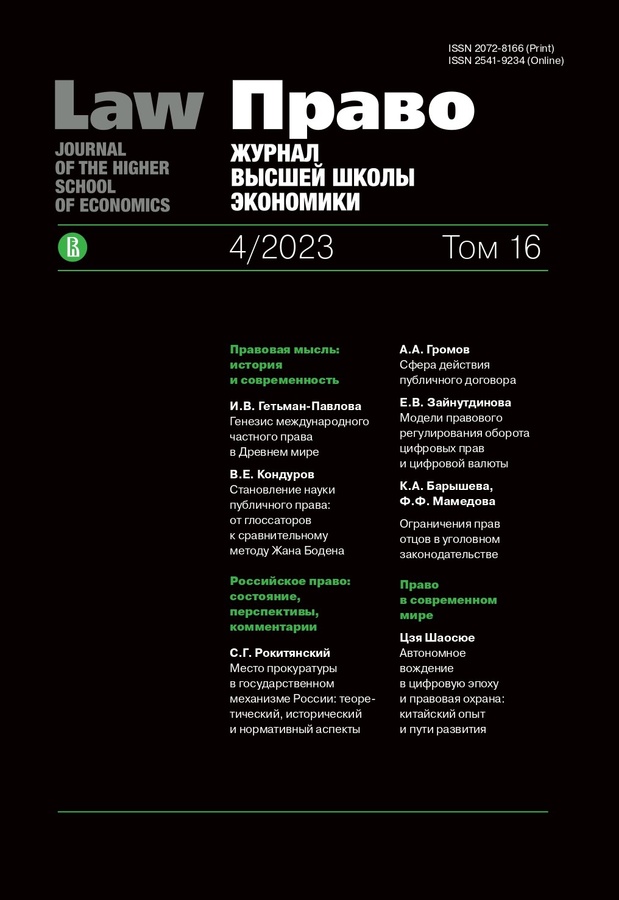Restrictions on Father’s Rights in Criminal Law
- Авторлар: Barysheva K.1, Mamedova F.1
-
Мекемелер:
- National Research University Higher School of Economics
- Шығарылым: Том 16, № 4 (2023)
- Беттер: 282-305
- Бөлім: Russian Law: Condition, Perspectives, Commentaries
- URL: https://journal-vniispk.ru/2072-8166/article/view/318275
- DOI: https://doi.org/10.17323/2072-8166.2023.4.282.305
- ID: 318275
Дәйексөз келтіру
Толық мәтін
Аннотация
Авторлар туралы
Ksenia Barysheva
National Research University Higher School of Economics
Email: noreply@hse.ru
ORCID iD: 0000-0002-6087-1671
Candidate of Sciences (Law), Associate Professor
Fatima Mamedova
National Research University Higher School of Economics
Email: noreply@hse.ru
ORCID iD: 0000-0002-5783-8336
Candidate of Sciences (Law), Associate Professor
Әдебиет тізімі
- Borisenko Y.V. (2007) Psikhologiya otsovstva=Psychology of Fatherhood. Moscow — Obninsk: IG-SOTCIN Press, 220 p. (in Russ.)
- Brusentseva N.A. (2021) Implementation of gender equality in criminal law of the Russian Federation. In: Russia in the 21st century: socio-economic, political and legal reforms. Papers of scholar conference. Barnaul: University, pp. 78-85 (in Russ.)
- Gasyukova E.N. et al. (2023) Many faces of gender discrimination. Primo Aspectu, no. 6, pp. 9-20 (in Russ.) DOI:https://doi.org/10.35211/2500-2635-2023-1-53-9-20
- Gutarenko A.K. (2021) Gender discrimination in the exercise of the right to work. In: National and regional security features: challenges and solutions. Arkhangelsk: University, pp. 152-161 (in Russ.)
- Kara I.S., Kara S.V. (2020) Murder of a newborn child by a mother: issues of legislative improvement. Voprosy rossiyskogo i mezhdunarodnogo prava =Russian and International Law Issues, no. 8, pp. 143-153 (in Russ.)
- Kazarina M.I., Chernopilskaya G.E. (2021) Gender characteristics in sentencing in Russian criminal law. Baikalsky nauchnyi zhurnal=Baikal Research Journal, vol. 12, no. 2, pp. 45-53 (in Russ.) DOI:https://doi.org/10.17150/2411-6262.2021.12(2).29
- Kon I.S. (2006) Why are fathers needed?https://magazines.gorky.media/zvezda/2006/12/zachem-nuzhny-otczy.html(in Russ.)
- Loginovskikh U.E. (2022) The gender discrimination in modern society. In: Russia in the 21st century, pp. 416-425 (in Russ.)
- Mizinova A.S. (2022) Gender differences in criminal law and criminology. In: Evolution of state and law: issues and prospects. Kursk: University Press, pp. 120129 (in Russ.)
- Morris A., Wilczynski A. (1993) Rocking cradle: mothers who kill their children In: R. Birch (ed.) Moving targets: women, murder and representation. L.: Virago press, pp. 198-217.
- Nozhenko M.O. (2021) Gender approach in Russian and international criminal law. In: Issues in the theory and practice of applying criminal law. Moscow: Yurlitinform, pp. 181-187 (in Russ.)
- Pchelintseva L.M. (2009) Family law of Russia. Textbook. Moscow: Norma, 719 p. (in Russ.)
- Probina S.S. (2017) Legal status of the father under Russian law. Izvestiya vysshikh uchebnykh zavedeniy. Povolzhskiy region. Obshchestvennyye nauki = News of Higher Education. Volga region. Social Sciences, no. 2. pp. 49-54 (in Russ.)
- Rumyantseva Y.N. (2022) Positive discrimination: concept and application features under the Russian Federation laws. Prolog: zhurnal o prave=Prologue: Journal on Law, no. 4, pp. 95-104 (in Russ.)
- Schmoller K. (2002) Abschaffung der Sonderregelung fur Kindestotung. In: Festschrift fur Karl Gossel zum 70 Geburtstag. Heidelberg: Lit. Muenster, S. 369-382.
- Usacheva E.A. (2019) Social fatherhood (motherhood): a problem statement. Rossiyskiy yuridicheskiy zhurnal=Russian Law Journal, no. 6, pp. 115-120 (in Russ.)
- Vysotskaya D.S., Rozum A.Y. (2023) Gender differences in criminal law and criminology. Ustoychivoye razvitiye nauki i obrazovaniya=Sustainable Development of Science and Education, no. 3, pp. 25-36 (in Russ.)
- Wolf G. Kriminalitat im Grenzgebiet. In: Das neue polnishe Strafgezetzbuch. Berlin: Springer, 558 S.
- Zykov S.V. (2020) Implementing rights of fatherhood in modern Russia. Pravo. Zhurnal Vysshey shkoly ekonomiki=Law. Journal of the Higher School of Economics, vol. 13, no. 3, pp. 44-71 (in Russ.) DOI:https://doi.org/10.17323/2072-8166.2020.3.44.71
Қосымша файлдар








